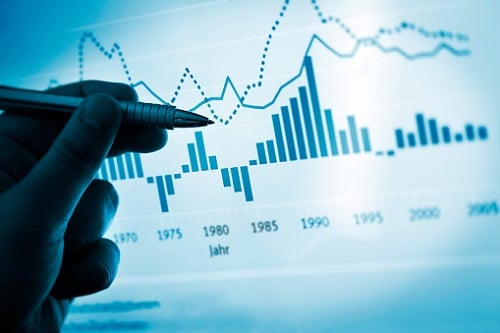Index investing is changing the markets — and active managers are starting to consider that

Various stock-pickers have spoken out against the rise of passive investment, calling it a crisis in the making. Now, active managers are starting to look for ways to profit from it.
As more individual stocks get wrapped up and bundled into ETF funds, analysts are starting to study how that creates opportunities and pitfalls for individual stocks, reported the Wall Street Journal. In this new form of due diligence, factors such as how much allocation it gets from in index funds and money flows into and out of such funds play a bigger part.
Citing Moody’s Investors Service, the Journal said that passive investing this year accounts for 29% of assets in US stock funds alone, and is expected to exceed 50% as early as 2021. That’s made it a legitimate consideration for stock-pickers — but not the top priority.
“[I think the appeal of a stock] comes back to earnings, the quality of management and the ability of a company to execute, but being in an ETF is a factor to be aware of,” Christopher Marinac, director of research at Atlanta-based FIG Partners, told the publication.
According to researchers, passive investing’s influence has been most pronounced for small- and mid-sized company stocks, which usually trade less frequently compared to the largest names. Pankaj Patel, head of quantitative research at Cirrus Research, conducted a series of studies and found dozens and small- or medium-sized companies that had more than 20% of their shares outstanding owned by ETFs.
“Portfolio managers should be aware of heavy ETF ownership,” Pankaj said. “It can be an advantage when flows are positive, but you want to be careful when they turn around.”
The recent US presidential election was a case in point. Analysts from Keefe, Bruyette & Woods said that some US$9 billion poured into financial ETFs in the month after the event. During that time, shares of companies that figured in such funds rose by a median of 19.4%, as opposed to 14.2% for financial companies that didn’t.
ETF ownership may also have an impact on volatility. Essentially, the more public shares of a stock (float) get held in passive funds, the less there are for active traders to buy. “Stocks with more float held by passive funds exhibit, on the margin, higher volatility,” said Savita Subramanian, equity and quantitative strategist at Bank of America Merrill Lynch.
But there are also benefits to being owned by indexes. Meredith Corp., a US media company, has 40% of its tradable shares owned by passive mutual and exchange-traded funds — the most out of any stock in the US market, said Jefferies analyst Steven DeSanctis.
In January, Meredith was tapped for inclusion in the index behind the $16-billion SPDR S&P 500 Dividend ETF. Just days after, the fund bought almost three million shares and became one of the company’s biggest single owners.
For more of Wealth Professional's latest industry news, click here.
Related stories:
Active fund managers turning away from ETFs
The rise and fall of smart beta
As more individual stocks get wrapped up and bundled into ETF funds, analysts are starting to study how that creates opportunities and pitfalls for individual stocks, reported the Wall Street Journal. In this new form of due diligence, factors such as how much allocation it gets from in index funds and money flows into and out of such funds play a bigger part.
Citing Moody’s Investors Service, the Journal said that passive investing this year accounts for 29% of assets in US stock funds alone, and is expected to exceed 50% as early as 2021. That’s made it a legitimate consideration for stock-pickers — but not the top priority.
“[I think the appeal of a stock] comes back to earnings, the quality of management and the ability of a company to execute, but being in an ETF is a factor to be aware of,” Christopher Marinac, director of research at Atlanta-based FIG Partners, told the publication.
According to researchers, passive investing’s influence has been most pronounced for small- and mid-sized company stocks, which usually trade less frequently compared to the largest names. Pankaj Patel, head of quantitative research at Cirrus Research, conducted a series of studies and found dozens and small- or medium-sized companies that had more than 20% of their shares outstanding owned by ETFs.
“Portfolio managers should be aware of heavy ETF ownership,” Pankaj said. “It can be an advantage when flows are positive, but you want to be careful when they turn around.”
The recent US presidential election was a case in point. Analysts from Keefe, Bruyette & Woods said that some US$9 billion poured into financial ETFs in the month after the event. During that time, shares of companies that figured in such funds rose by a median of 19.4%, as opposed to 14.2% for financial companies that didn’t.
ETF ownership may also have an impact on volatility. Essentially, the more public shares of a stock (float) get held in passive funds, the less there are for active traders to buy. “Stocks with more float held by passive funds exhibit, on the margin, higher volatility,” said Savita Subramanian, equity and quantitative strategist at Bank of America Merrill Lynch.
But there are also benefits to being owned by indexes. Meredith Corp., a US media company, has 40% of its tradable shares owned by passive mutual and exchange-traded funds — the most out of any stock in the US market, said Jefferies analyst Steven DeSanctis.
In January, Meredith was tapped for inclusion in the index behind the $16-billion SPDR S&P 500 Dividend ETF. Just days after, the fund bought almost three million shares and became one of the company’s biggest single owners.
For more of Wealth Professional's latest industry news, click here.
Related stories:
Active fund managers turning away from ETFs
The rise and fall of smart beta



